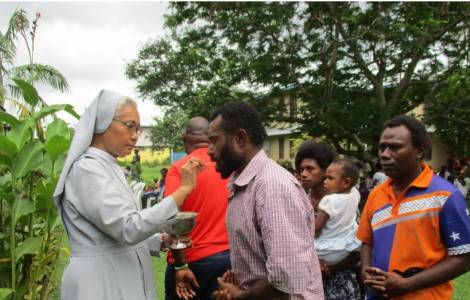
FMA
by Antonella Prenna
Port Moresby (Agenzia Fides) - “In Papua New Guinea, mission meets cultural diversity. Understanding the cultural differences of people is a serious task and takes time,” says Sister Pamela Vecina, of the Daughters of Mary Help of Christians (FMA), who recently returned to the General House in Rome after 22 years in Papua New Guinea, to Fides.
“I arrived in Papua New Guinea in January 2001 as a missionary among our sisters, the Salesian Sisters, and was invited to train university students at the Don Bosco Technological Institute in Port Moresby,” says the nun.
At the end of the apostolic journey of Pope Francis, who visited Indonesia, Papua New Guinea, East Timor and Singapore, Sister Pamela affirmed: "The Pope's visit represents an epochal event that will go down in the history of the country, especially among Catholics. His solidarity, which leads him to visit the farthest and most remote areas, is a solid testimony to his teachings. For me, the message of reconciliation, peace and faith in the power of Christ, which is above all traditional beliefs, is a concrete invitation to change for the Papuans. Above all, the visit to the most remote areas such as Vanimo impressed the locals, who were in awe of his presence and closeness. Everyone, from the government, bishops, religious and priests to families, youth and children, greatly appreciated his reaching out to them despite his advanced age and state of health.”
“I see this gift from Pope Francis as an expression of a Christ-like passion to touch the lives of people on the fringes of the world, despite their status, amid poverty and frustration. May this impressive and touching visit awaken in the hearts of people, especially young people, the passion to change their lives and bring about change in their families,” Sister Pamela continued.
“For those working in education,” the missionary continued, “Pope Francis’ visit was a stimulus to the service of accompanying young people in their growth of faith. For Christians in PNG, may this event lead to practicing dialogue and striving for the common good and community.”
Speaking of her experience in the mission, the FMA sister says: "The country is rich in cultures and traditions and it is important to know its values well in order to help people appreciate and evangelize them. Strong traditional beliefs are a serious challenge for the new evangelization, especially for the younger generations who are experiencing the great leap towards modernization and new social technologies. Unfortunately, there is a lot of poverty, as in other countries, and with many young people out of school and lacking job opportunities, lawlessness is one of the challenges in society that also affects the work of missionaries. It is necessary to instill respect, equality and critical thinking in young people."
"Papua New Guinea is a multi-religious country and one of the tangible characteristics of Christians in this country is an inclusivity that accepts others rather than discriminating against them," acknowledged Sister Pamela. The Pope's visit is also a new opportunity "for cooperation between the government and the Catholic Church and friendly relations between the Christian churches in the country".
"We must recognize the work that the missionaries and the Church as a whole have done so far," adds Sister Pamela, speaking of joint efforts, "especially in the areas of education and health". "The missionaries are also very valued because they provide these services to the population in collaboration with the government. My personal experience was that I was very valued as a lecturer at the university. My students also considered me a spiritual companion, mentor and counselor. Today, therefore, education is increasingly perceived as a fundamental right and the commitment of missionaries in this field is becoming increasingly important".
(Agenzia Fides, 14/9/2024)